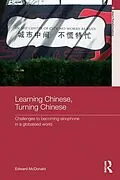In this book Edward McDonald takes a fresh look at issues of language in Chinese studies. He takes the viewpoint of the university student of Chinese with the ultimate goal of becoming 'sinophone': that is, developing a fluency and facility at operating in Chinese-language contexts comparable to their own mother tongue. While the entry point for most potential sinophones is the Chinese language classroom, the kinds of "language" and "culture" on offer there are rarely questioned, and the links between the forms of the language and the situations in which they may be used are rarely drawn. The author's explorations of Chinese studies illustrate the crucial link between becoming sinophone and developing a sinophone identity - learning Chinese and turning Chinese.
Including chapters on:
- relating text to context in learning Chinese
- the social and political contexts of language learning
- myths about Chinese characters
- language reform and nationalism in modern China
- critical discourse analysis of popular culture
- ethnicity and identity in language learning.
This book will be invaluable for all Chinese language students and teachers, and those with an interest in Chinese linguistics, linguistic anthropology, critical discourse analysis, and language education.
Edward McDonald is currently Lecturer in Chinese at the University of Auckland, and has taught Chinese language, music, linguistics and semiotics at universities in Australia, China, and Singapore.
Autorentext
McDonald, Edward
Inhalt
Preface: Language in Chinese Studies Part 1: The Great Wall of Chinese Language Teaching 1. Arguing Semantics with a Beijing Taxi Driver: Relating Text and Context in a Chinese Studies Program 2. Gateways to Becoming Sinophone: Traditions and Biases in Chinese Language Textbooks 3. Learning Chinese the Lee Kwan Yew Way: The Social and Political Context of Language Learning Part 2: Drawing Battlelines over Language 4. Character Fetishization: The Modus Operandi of Orientalism in Chinese Studies 5. Ideolatry vs Phonolatry?: Chinese Characters as Disciplinary Identifier 6. Keeping Chinese for the Chinese: The Paradox of Nativised Orientalism in Chinese Linguistics Part 3: Getting Over the Walls of Discourse 7. Construing 'Metrosexual' in Chinese: Social and Semiotic Change in the Era of Globalisation 8. Reconstruction vs Deconstruction: Textual Criticism, Social Semiotics, and 'New Sinology' 9. From 'Ed McDonald' to 'Ned McHorse': Negotiating Multiple Identities in a Globalised World
